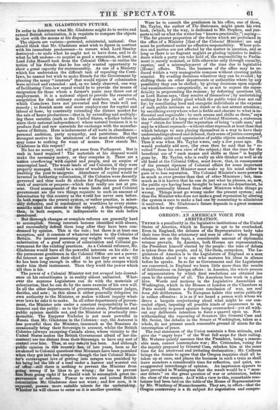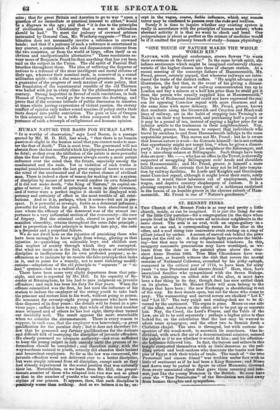OREGON: AN AMERICAN VOICE FOR ARBITRATION.
THERE is a peculiarity in the legislative institutions of the United States of America, which in Europe is apt to be overlooked. Even in England, the debates of the Representative body take their tone from the aristocracy and men in office : when foreign relations are on the tapis, a considerable amount of diplomatic retenue prevails. In America, both Houses are representative, the President himself elected by the people : the tone of debate is taken from the people, and is, like them, outspoken. The Le- gislature of America is to the Legislature of England as a man who thinks aloud is to one who matures his ideas in silence before he speaks. In so far as Government and the Legislature are concerned, in England we learn little more than the results of deliberations on foreign affairs : in America, the whole process of argumentation by which final resolutions are obtained lies open to the scrutiny of all. The American bees work in a glass hive. Words and motions in the Legislative Assemblies at Washington, which in the Houses at London or the Chambers at Paris would denote a foregone conclusion of war, are real bona fide deliberation. To European habits this entire publicity is rather offensive : it is as if we heard a person with whom we drove a bargain conjecturing aloud what might be our con- cealed object, imputing all possible kinds of meannesses to us, in his anxiety to guard against being overreached—yet all with- out any deliberate intention to force a quarrel upon us. Not- withstanding the vapouring of Senators like General Cass and Mr. Sevier, the debates in the Senate at Washington, taken as a whole, do not present much reasonable ground of alarm for the interruption of peace. The real statesmen of the Union maintain a firm attitude, and give the " angry boys " of the West full scope for their railing. Mr. Webster quietly assumes that the President, being a reason- able man, cannot contemplate war ; Mr. Crittenden, voting for the inquiry proposed by General Cass, rebukes him at the same time for his irrelevant and irritating declamation ; Mr. Calhoun brings the Senate to agree that the Oregon inquiries shall all be taken up at once, and places the business in such a train as shall leave members a considerable time for reflection, and quiet, un- exaggerated interchange of opinion. An impression appears to have prevailed in Washington that the result would be a " mon- ster debate" on the great question of war or arbitration, before the close of the session. As if with a view to this, remarkable reso- lutions had been laid on the table of the House of Representatives by Mr. Winthrop of Massachussetts. They are, in effect—that the Oregon controversy is a fit subject fcr negotiation and compro-
miser that for great Britain and America to go to war "upon a question of no immediate or practical interest to either," would be a disgrace to the age ; and that " it is due to the principles bf civilization and Christianity that a resort to arbitration should be had." To meet thejealousy of crowned arbiters insinuated by General Cass, Mr.. Winthrop suggests—" That ar- bitration does not necessarily involve a reference to crowned leads; and that if a jealousy of such a reference is entertained in any quarter, a commission of able and dispassionate citizens from the two countries, or from the world at large, offers itself as an -obvious and unobjectionable alternative." These resolutions sa- vour more of Benjamin Franklin than anything that has yet been said on the subject in the Union. The old spirit of Faneuil Hall breathes throughout them. The idea of referring the disputes of nations to a tribunal of the most intelligent and moral citizens of their age, whatever their nominal rank, is conceived in a sound utilitarian spirit—with a due sense of moral greatness. It was as a guarantee of the progress of such maxims of state policy, that the foundation of the experimental republic of the old Thirteen Vas hailed with joy in every clime by the philanthropists of last century. Strong majorities in favour of such resolutions, in both Houses of Congress, would go far to reassure the doubting, and prove that if the.extreme latitude of public discussion in America at times elicits jarring expressions of violent passion, the stormy onflict of opinion only makes sound maxims of policy strike their Toots deeper into public conviction. The gain or loss of Oregon to this country would be a trifle when compared with the im portance of such a triumph of enlightened and humane opinion.



























 Previous page
Previous page